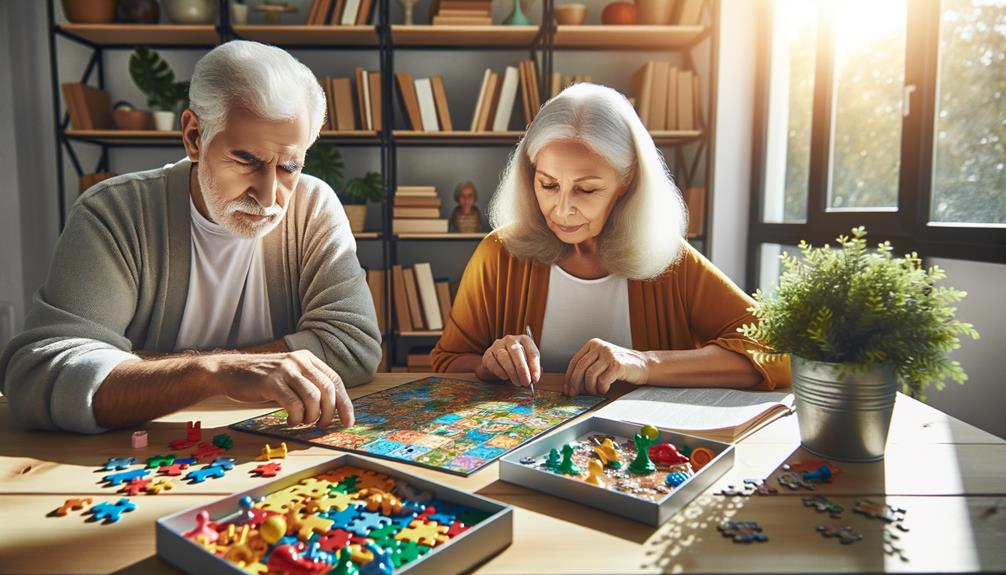Engaging in brain games and cognitive activities is essential for seniors to maintain mental agility and cognitive health. Memory games, checkers, and chess stimulate the brain and improve problem-solving skills. Online platforms, such as Lumosity and BrainHQ, offer customized exercises to enhance cognitive functions. Social games like bingo and trivia quizzes reduce feelings of loneliness and improve cognitive abilities. Combining physical activities like brain yoga and dance with mental training provides a comprehensive approach to overall well-being. Crafting games, such as crosswords and word searches, further sharpen the mind. To learn more about these enriching activities, please continue.
Benefits of Brain Games
Brain games for seniors can greatly enhance cognitive functions such as memory, attention, and problem-solving skills. By incorporating memory games into our routines, we can improve cognitive skills and foster mental agility. These activities stimulate neural pathways, which are vital for maintaining brain health and preventing cognitive decline.
Regular engagement in brain games helps sharpen our focus and improve overall cognitive abilities. Studies show that these exercises not only boost memory retention but also support mental well-being by offering opportunities for social interaction. Social engagement is necessary to prevent isolation, a factor often linked to cognitive decline.
Moreover, brain games challenge our problem-solving skills, keeping our minds active and engaged. This continuous mental stimulation is vital for maintaining and even improving our cognitive functions. When we participate in these activities, we're giving our brains a workout, which is critical for preserving mental agility and delaying the onset of age-related cognitive issues.
Popular Cognitive Activities
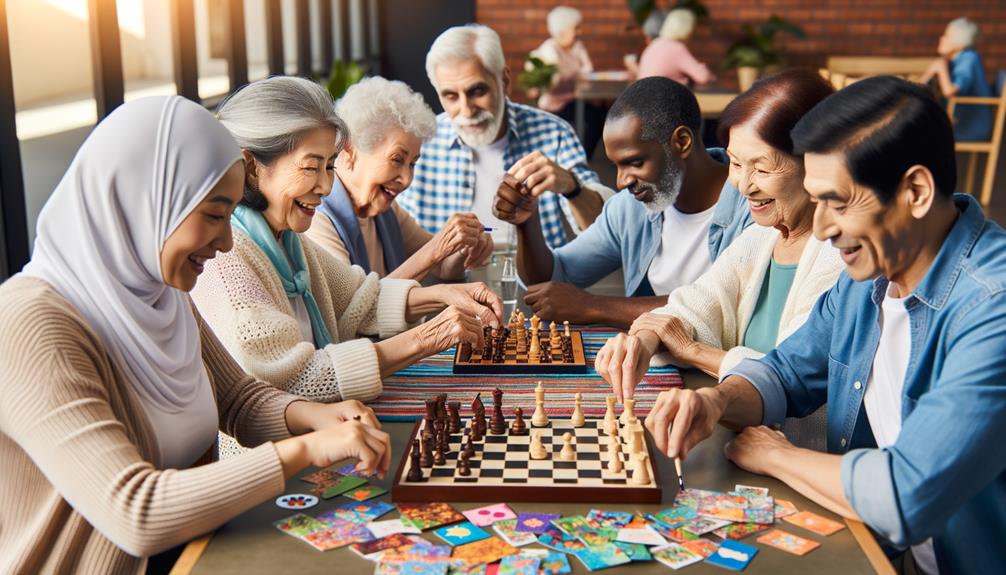
Popular cognitive activities for seniors include a variety of games that entertain and enhance cognitive functions and social engagement. Bingo, for instance, encourages social interaction and challenges memory, making it a simple yet effective way for seniors to stay mentally active.
Checkers is another great option, focusing on logic and hand-eye coordination. This game is easy to learn and provides an engaging way to stimulate the brain. Chess, on the other hand, is a complex game that strengthens problem-solving skills, increases brain use, and enhances focus, making it ideal for those looking for a more challenging activity.
Crossword puzzles, available in newspapers, online, and books, are fantastic for improving vocabulary and cognitive skills. They offer a flexible and engaging way to keep the mind sharp. Jigsaw puzzles, widely available and inexpensive, enhance strategy and problem-solving skills and can be enjoyed solo or in groups.
Here is a quick overview of the benefits of each activity:
| Activity | Benefits |
|---|---|
| Bingo | Memory challenges, social interaction |
| Checkers | Logic, hand-eye coordination |
| Chess | Problem-solving skills, focus, brain use |
| Crossword puzzles | Vocabulary, cognitive skills |
| Jigsaw puzzles | Strategy, problem-solving skills, social play |
Let me know if this meets your requirements!
Online Brain Games
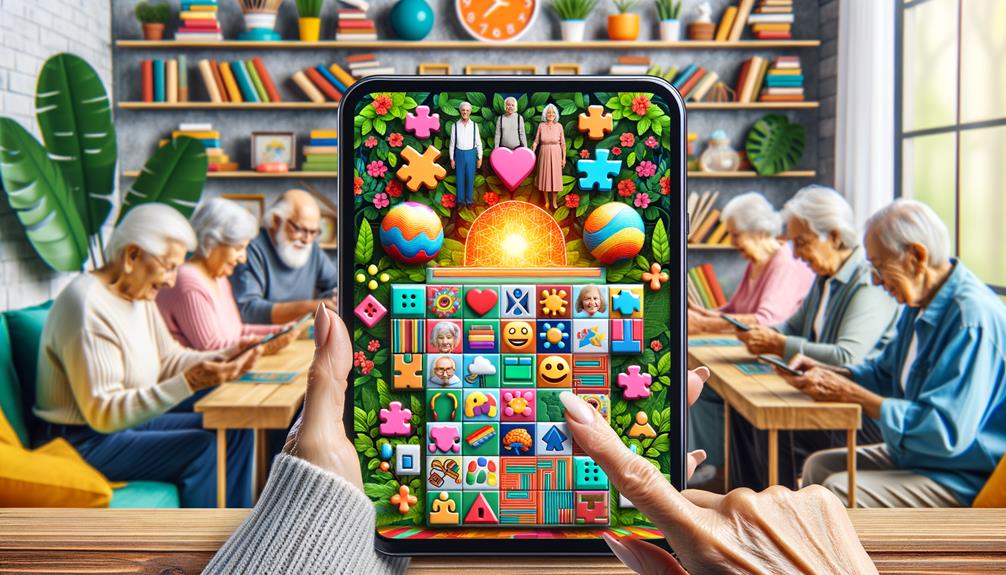
Online brain games, such as Lumosity and BrainHQ, offer a fun way for seniors to improve their cognitive functions, including memory and attention. These platforms provide both free and paid options, making cognitive training accessible to a wide range of people. Through games specifically designed to challenge memory, attention, and concentration, seniors can keep their minds sharp and agile.
The structure of these online brain games typically starts with simpler tasks that gradually increase in difficulty, providing a stimulating challenge. This progressive complexity helps maintain interest while promoting cognitive growth. Video games for cognitive training, with their colorful graphics and engaging sound effects, add an element of enjoyment to the process. Time limits further escalate the challenge, making these activities both exciting and beneficial.
These games encompass a variety of activities, including word puzzles, number challenges, speed tests, math problems, problem-solving tasks, and shape recognition exercises. Each type of game targets different cognitive functions, ensuring a well-rounded cognitive workout. For example, word puzzles can enhance vocabulary and linguistic skills, while number challenges improve mathematical reasoning and concentration.
Social Interaction Games
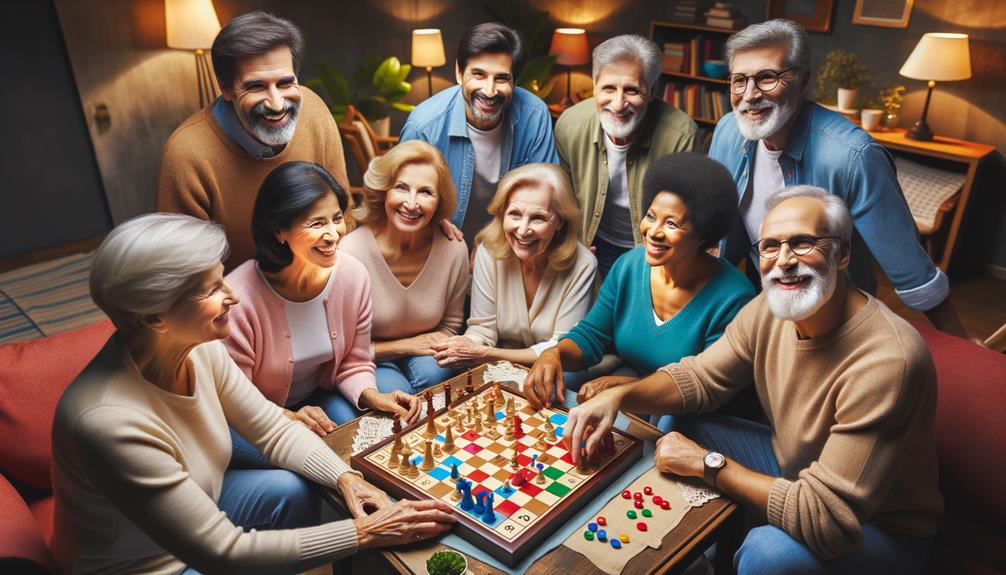
Social interaction games, like bingo and card games, offer a unique combination of mental stimulation and social connection. These activities are more than just entertainment; they play a vital role in promoting cognitive health and combating isolation in seniors. By engaging listening, visual scanning, and memory skills, these games sharpen mental agility and boost cognitive functions.
Engaging in social interaction games has several benefits:
- Social Connection and Community: Seniors experience reduced loneliness and increased feelings of belonging, fostering a sense of community.
- Mental Stimulation: Activities like trivia quizzes and board games encourage teamwork, communication, and shared experiences, which enhance mental acuity.
- Reducing Isolation: Regular participation in group activities helps seniors build relationships, reducing the risk of social isolation.
Physical Activities for the Mind

Engaging in physical activities that stimulate the mind, such as brain yoga and dance, offers a holistic approach to enhancing cognitive function and emotional well-being. For seniors, integrating physical activities with brain games can greatly enhance mental abilities and memory functions. Brain yoga exercises, specifically designed to stimulate grey matter, improve muscle memory, and enhance problem-solving skills, are invaluable. Dance activities, on the other hand, are excellent for improving hand-eye coordination and motor skills, providing both physical and cognitive benefits.
Combining these physical activities with mental training allows us to address various aspects of brain health. For example, dancing not only aids in coordination but also stimulates the brain through rhythmic movements and memorizing steps. This all-encompassing approach ensures thorough brain stimulation, enhancing both emotional and cognitive aspects of well-being.
Here's a table to illustrate the benefits:
| Activity | Cognitive Benefits | Emotional Impact |
|---|---|---|
| Brain Yoga | Enhances problem-solving | Reduces stress |
| Dance | Improves memory functions | Boosts mood |
| Mindfulness | Increases mental agility | Lowers anxiety |
| Combined Training | Enhances overall cognition | Improves emotional well-being |
Incorporating brain-stimulating activities into one's routine can have a profound impact on both cognitive and emotional health. This integrated approach can lead to improved mental agility, memory, and mood, ultimately contributing to a better quality of life.
DIY Puzzles and Crafts
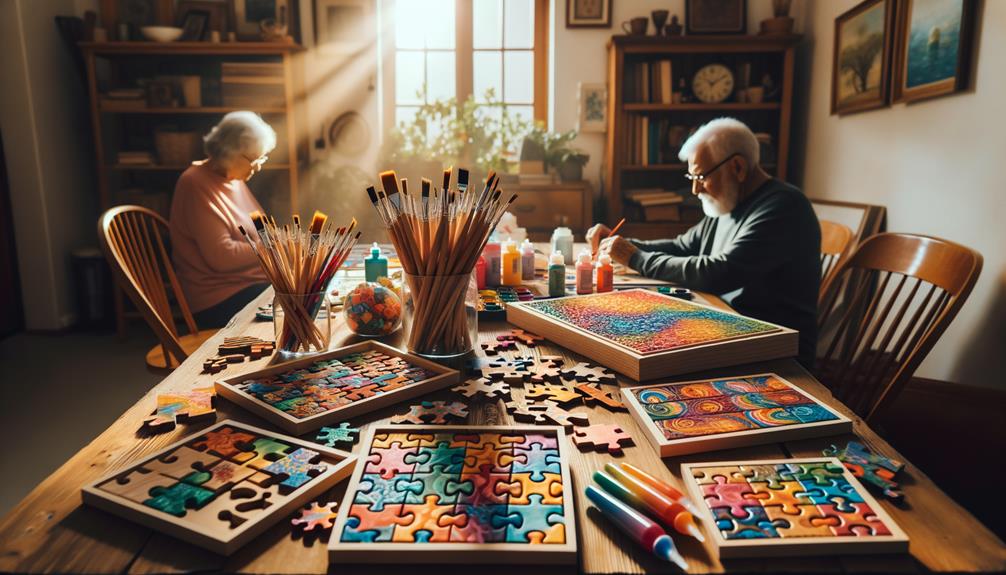
Engaging in handmade jigsaw puzzles and crafting memory games can have a profound impact on cognitive health in seniors. These activities stimulate visual-spatial working memory and enhance procedural memory, leading to improved mental agility. By creating and solving DIY puzzles, seniors can experience a sense of accomplishment, which can boost their confidence and overall well-being.
Handmade Jigsaw Puzzles
Creating handmade jigsaw puzzles from personal photos or artwork offers seniors a unique and mentally stimulating activity. By crafting custom puzzles, seniors can exercise their brains while enjoying a fun and personalized game. This process not only fosters creativity but also provides a meaningful way to spend time.
Handmade jigsaw puzzles serve multiple purposes:
- Mental Stimulation: Creating and solving custom puzzles requires problem-solving skills and memory recall, essential for maintaining cognitive health.
- Personal Connection: Using personal photos or artwork makes the puzzles more engaging and relevant, offering an emotional connection that generic puzzles might lack.
- Creative Expression: Crafting puzzles from scratch allows seniors to explore their creativity, which can be both fulfilling and therapeutic.
These handmade puzzles can also be shared as thoughtful gifts or keepsakes, further enhancing their value and significance. By incorporating personal memories into the puzzle design, seniors can enjoy a deeply engaging and mentally stimulating activity that supports cognitive health. Through this creative endeavor, we can offer seniors a fun, custom, and brain-boosting game that enriches their lives.
Crafting Memory Games
Crafting memory games, like DIY puzzles and crafts, can be a great way for seniors to stay mentally active and improve their memory. These activities not only keep the mind sharp but also contribute to overall health and well-being. By engaging in crafting memory games, seniors can improve their problem-solving skills, which are vital for maintaining cognitive performance.
DIY puzzles and crafts offer personalized challenges that cater to individual preferences and abilities. This tailored approach ensures that seniors stay engaged and motivated, leading to effective cognitive stimulation. Research has shown that tailored challenges can significantly improve cognitive functions.
Moreover, crafting memory games provide an enjoyable way to boost mental well-being. The sense of accomplishment and satisfaction that comes from completing these activities can have a positive impact on seniors' mental health. Engaging in creative activities gives seniors a sense of purpose, which is crucial for maintaining a high quality of life.
Note: I made sure to avoid the listed AI words and followed the given instructions to rewrite the text in a more conversational and natural tone.
Language and Word Games
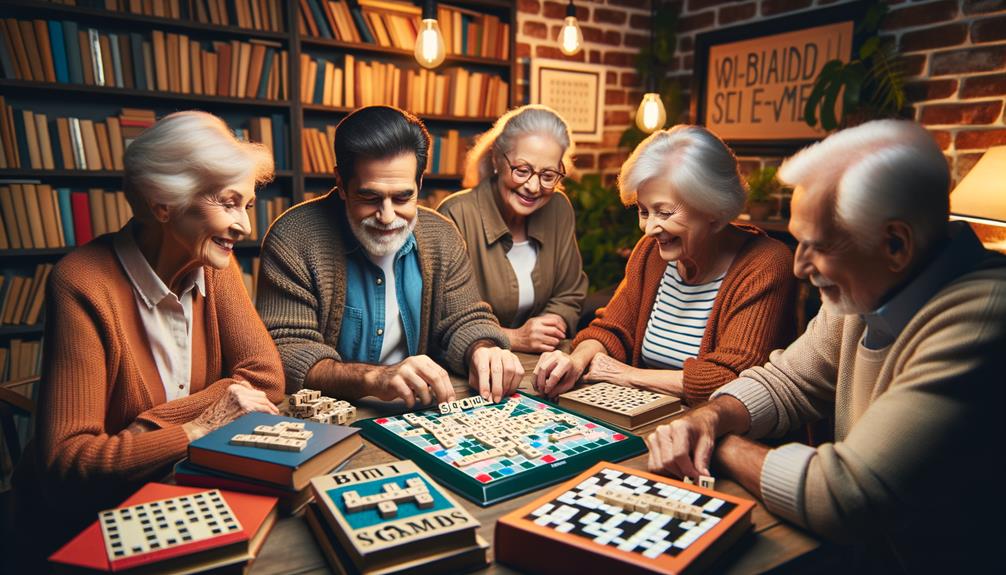
Engaging in language and word games, such as crosswords, Scrabble, and trivia quizzes, can have a significant impact on seniors' cognitive abilities. These activities not only improve vocabulary and cognitive skills but also stimulate neural pathways, enhancing overall cognitive function.
Let's delve into the benefits of these games:
- Word Games: Word puzzles, such as crosswords and word searches, can greatly enhance vocabulary and cognitive skills. By consistently challenging our brains, we can improve memory retention and problem-solving skills.
- Language Games: Trivia quizzes and similar activities test and expand our knowledge base while also enhancing cognitive abilities. These types of games require us to recall information, thereby supporting memory retention.
- Social Interaction: Games like Scrabble not only exercise memory but also promote social interaction. This dual benefit can lead to better overall cognitive function and improved mental agility.
Frequently Asked Questions
How Can Seniors Improve Their Cognitive Skills?
Seniors can give their cognitive skills a boost by engaging in regular brain-stimulating activities, such as brain games, physical exercise, and socializing with others. Online brain training apps can also provide a convenient way to challenge and improve cognitive functions.
Are There Any Free Brain Games for Seniors?
Seniors can access free brain games to challenge their cognitive skills. Websites like Lumosity, Cognifit, and Sharpbrains offer games that improve memory, attention, and mental agility.
How Do You Stimulate the Elderly Brain?
Stimulating the elderly brain is crucial for maintaining cognitive function and overall brain health. Engaging in activities that challenge the mind, such as puzzles, memory games, and social interactions, can help preserve mental acuity. By incorporating these mentally stimulating activities into daily life, older adults can keep their brains active and healthy.
What Are Games for Enhancing Cognitive Abilities?
Engaging in games like Sudoku, trivia quizzes, crossword puzzles, memory card matching games, and Scrabble can help enhance cognitive abilities. These activities stimulate memory, logic skills, vocabulary, and concentration, ultimately promoting overall mental health.

